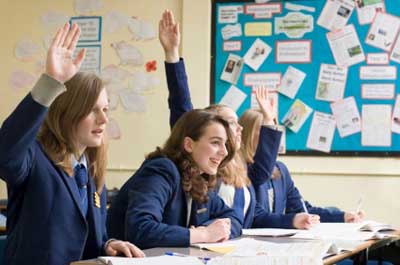(单词翻译:单击)
情景对话
Todd: Marion, at the school you work at, do the children wear uniforms?
托德:玛丽恩,你工作的那所学校要求孩子们穿校服吗?
Marion: Yes they do.
玛丽恩:是的,孩子们要穿校服。
Todd: Ah, that's terrible.
托德:啊,那真糟糕。
Marion: Do you think so?
玛丽恩:你这么认为吗?
Todd: Yeah.
托德:对。
Marion: I think it's a good thing that they wear uniforms. For them, and for their parents too.
玛丽恩:我认为穿校服是件好事。对他们是这样,对他们的父母也是这样。
Todd: Why?
托德:为什么?
Marion: Well, because when they wake up in the morning, they don't have to think about what they wear for that day. So, it saves time, they can have extra time in bed maybe, and for their parents it saves them a lot of money, I think.
玛丽恩:嗯,因为早上他们起床后就不用去想要穿什么了。所以这会节省时间,他们可以多睡一会儿,而对他们的父母来说,我想这样也为他们节省了很多钱。
Todd: See, I disagree. First of all, when children are young, they're starting to be creative for the first time. So, just by choosing what they're going to wear every day, they're can show their creativity, or their individuality, you know? Also, it helps students learn to make choices, to make decisions, to make decisions for themselves. I don't know, like a uniform you take that away from children.
托德:我明白了,不过我不同意。首先,我认为这是在孩子们小的时候开始培养他们的创造力的好时机。通过选择每天要穿的衣服他们能显示出他们的创造力和个性,你明白吗?而且,这也会帮助学生们学习如何做选择,如何做决定,如何为自己做决定。虽然我不太懂,不过我希望孩子们可以不用穿校服。
Marion: I think they can learn how to choose in other ways, maybe, I don't know the accessories they wear, but basically that everybody is in the same clothes I think is really good, just to make everybody equal. Did you wear a uniform when you were at school?
玛丽恩:我觉得也许他们可以从其他地方学习如何进行选择,我不太清楚他们的配饰,不过我认为,所有人都穿一样的衣服很好,这是为了要做到人人平等。你上学的时候穿过校服吗?
Todd: No I didn't. And looking back, I'm glad I didn't, because you know, your clothes reflect your personality, and I think that it's important for kids to be able to show how they are as a person, through their clothes.
托德:没有,没穿过。回想一下的话,我很高兴我不用穿校服,因为你知道,你的衣服会反映你的个性,我认为让孩子们通过衣服来显示出他们是怎样的一个人很重要。
Marion: But maybe if you can show your personality through your personality, and you don't need your clothes to show your personality, then that's a bit better, I think.
玛丽恩:可是你也可以通过性格来显示你的个性,你不必非得用衣服来显示个性,我认为这样更好一些。
Todd: That's a good point. I guess I just can't imagine wearing a uniform every day. Plus, I mean if you wear a uniform every day it must get really old, really repetitive, the same thing again and again and again. And I think that mentally, that can be tiring.
托德:这点很有道理。我想我只是不能想象每天要穿着校服的生活。另外,如果你每天穿校服,那校服一定变得很旧,而且每天都要穿一样的衣服会让人觉得很烦。
Marion: I think that it might be tiring, or worrying mentally if you, for example, if you see other children in your school who have nicer clothes, more expensive clothes, and your parents can't afford those kind of clothes. Then, it makes you feel left out when you're a child, and that's really, really awful if you feel that way as a child, just because of clothes and money I think.
玛丽恩:举个例子来说,如果你看到学校里的其他孩子穿的衣服比你好,比你的贵,而你的父母买不起那样的衣服,那你心里会觉得烦恼或是忧虑。而且还会让你觉得你被排挤了,我认为,如果是因为衣服和钱让你在孩提时代感受到那些那就太糟糕了。
Todd: Well, did you wear a uniform?
托德:嗯,你以前穿过校服吗?
Marion: Yes.
玛丽恩:穿过。
Todd: Did you feel that way?
托德:你有那种感受吗?
Marion: I went to school in Ireland, so almost all schools have uniforms, so for us it felt very normal, that when I was in primary school we had a uniform, and then in secondary school a different uniform, and my brother's school had a uniform, so it's normal for us. So, I thought it was OK, sometimes you do get bored, but I think overall it saved us time in the morning, which is good.
玛丽恩:我是在爱尔兰上的学,那里几乎所有学校都要求穿校服,所以这对我们来说很平常,我上小学的时候会穿校服,升到初中之后会换另一套校服,而且我哥哥上的学校也要穿校服,所以对我们来说很平常。我认为那没什么,虽然有的时候确实是会有些烦,不过我认为总体来说,这为我们在早上节省了时间,这点很好。

重点讲解
重点讲解:
1. first of all
第一;首先;
eg. First of all, this complex problem that they feel discouraged, but after thinking it over carefully they finally worked out a solution.
起初,这个复杂的问题使他们感到灰心,但经过仔细思考他们终于研究出了解决办法。
eg. I was quite surprised first of all and was trying to find out from Ellen for the longest time what this was about.
我首先是很吃惊,在很长一段时间里,我都想从Ellen那里弄清楚这到底是怎么一回事。
2. look back
追忆;回顾;
eg. Looking back, I am staggered how easily it was all arranged.
回头一想,我惊异地发现这一切的安排竟是如此简单。
eg. When I look back now, I realize what a trial I must have been to my friends and relatives.
当我回头看时,我才发现,那段时光对于我的朋友和亲戚们来说是一种考验。
3. leave out
排除;不包括;
eg. Some would question the wisdom of leaving her out of the team.
有人会质疑把她排除在队伍之外是否明智。
eg.If you prefer mild flavours reduce or leave out the chilli.
如果喜欢清淡的口味,可少放或不放辣椒。


